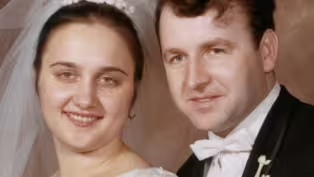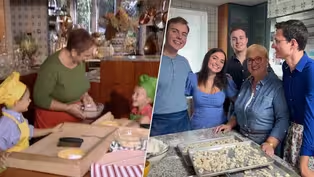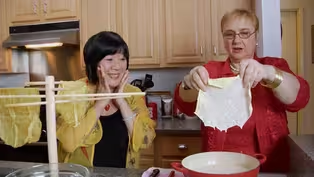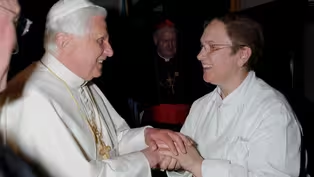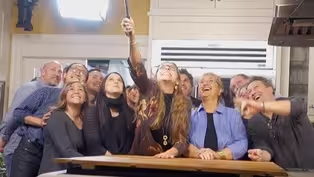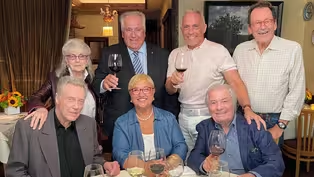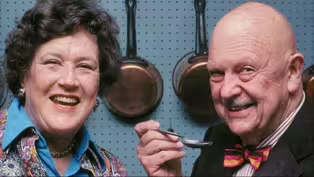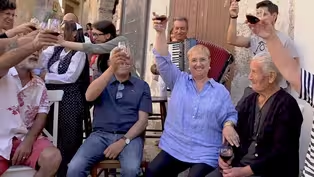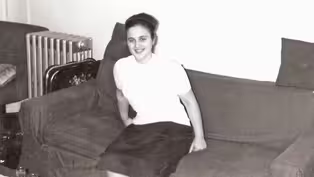
25 Years with Lidia: A Culinary Jubilee
12/18/2023 | 55m 26sVideo has Closed Captions
Lidia Bastianich celebrates 25 years on television with family and celebrity friends.
Beloved chef Lidia Bastianich is celebrating 25 years on public television. With one of the longest running cooking shows on PBS, Lidia is also a life-long restaurateur and bestselling cookbook author. In honor of her silver anniversary, join Lidia’s family and celebrity friends to roll back the years and get an intimate look at the memorable moments of her life, both on and off the screen.
Problems playing video? | Closed Captioning Feedback
Problems playing video? | Closed Captioning Feedback

25 Years with Lidia: A Culinary Jubilee
12/18/2023 | 55m 26sVideo has Closed Captions
Beloved chef Lidia Bastianich is celebrating 25 years on public television. With one of the longest running cooking shows on PBS, Lidia is also a life-long restaurateur and bestselling cookbook author. In honor of her silver anniversary, join Lidia’s family and celebrity friends to roll back the years and get an intimate look at the memorable moments of her life, both on and off the screen.
Problems playing video? | Closed Captioning Feedback
How to Watch 25 Years with Lidia: A Culinary Jubilee
25 Years with Lidia: A Culinary Jubilee is available to stream on pbs.org and the free PBS App, available on iPhone, Apple TV, Android TV, Android smartphones, Amazon Fire TV, Amazon Fire Tablet, Roku, Samsung Smart TV, and Vizio.
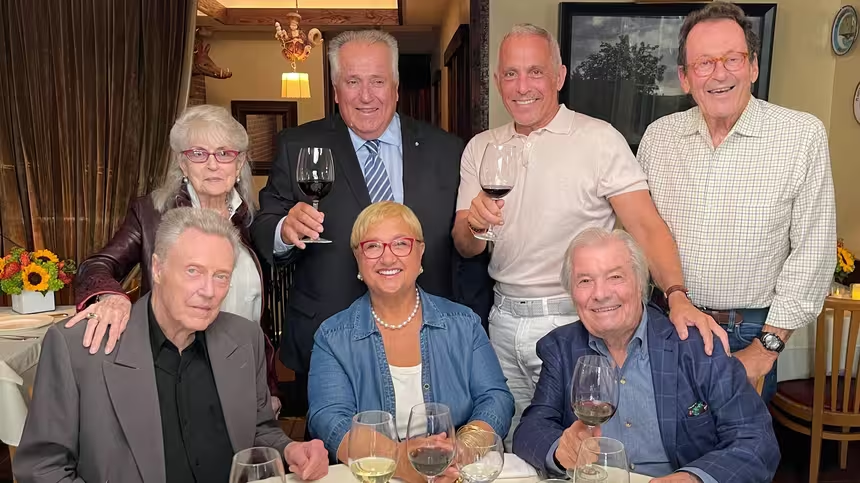
25 Years with Lidia: A Culinary Jubilee
Watch as Lidia rolls back the years and takes a very intimate look at the trajectory of her life both on and off the screen.Providing Support for PBS.org
Learn Moreabout PBS online sponsorship>> LIDIA: Pasta, pasta, pasta.
>> NARRATOR: She's a familiar face to millions of Americans.
>> Please welcome Lidia!
>> LIDIA: I want to invite you... >> Lidia's like Madonna.
You don't have to say her last name.
>> Action!
>> NARRATOR: An icon of Italian food.
>> Lidia became queen mom of authentic Italian cooking.
>> LIDIA: Big flavors here.
>> 13 best-selling cookbooks, several restaurants, her own line of pastas and sauces.
>> NARRATOR: For 25 years, she's encouraged Americans to gather together around the table... >> I don't think there's anything that makes her happier than seeing people enjoy food.
(laughter) >> NARRATOR: ...shared stories of fellow immigrants and refugees.
>> She's been the voice for so many of us that had that kind of background, that kind of experience.
>> NARRATOR: And paved the way for women in the restaurant industry.
>> Back in the late '70s, people thought we were housewives having fun, and not really serious about our craft.
(cheers) >> A lot of people tell me that watching her growing up, it's having her as their grandma.
And I'm like, "No, no, no, that's my grandma."
>> And the Emmy goes to... Lidia Bastianich!
(cheers and applause) >> LIDIA: Salute!
>> NARRATOR: Join us as we celebrate 25 years of Lidia.
>> LIDIA: So, as we say in my house, Tutti a tavola a mangiare!
♪ ♪ (birds chirping) ♪ ♪ (indistinct chatter) >> Okay, I think we're... ♪ ♪ >> Whoa.
(indistinct chatter) >> People always ask, like, "Oh, what's Lidia really like?"
She's exactly who you see on TV.
>> We are set!
>> If you don't know Lidia, you will know her through her food.
She's straightforward, honest and someone who wants to teach you something.
>> Lidia comes across as the Italian grandmother.
Italian grandmothers are tough.
>> LIDIA: What do you think, it needs ironing?
>> Does it look like it needs ironing?
>> She's kind of, like, a bit of a badass when it comes to business things.
She's not willing to take (muted) from people.
Very demanding, exacting in her expectation.
>> LIDIA: Roll up your sleeves.
Get in the kitchen.
>> She is true and honest but she has no problem being funny and, like, human.
Close your legs, chicken.
>> That's what Grandma would say.
(laughs) >> She immigrated here as a young kid.
>> LIDIA: Get ready for the open.
>> She is the quintessential New York story.
>> Have fun!
♪ ♪ >> LIDIA: I've been fortunate to call New York my home for most of my life.
It's such a unique and inspiring place.
The skyline, the shows, music, and, of course, the food.
But my story, like many New Yorkers, began far away.
♪ ♪ For generations, my family lived on the Istrian Peninsula, a northeastern region of Italy.
The year I was born, Istria was given to the newly formed Communist Yugoslavia, part of the price Italy paid for losing the war.
There was an exodus of Italians that went back into Italy, literally carrying their goods on their shoulders or on their carts.
They even dug out the bones of their family members that were dead to take them and to rebury them in Italy.
My parents chose to stay.
As an infant and growing into a young child, that period, you know, was very comfortable with the affection of Grandma, Grandpa.
That was quite a warm place.
But the weight on my parents in not being able to give us the education, not being able to speak to us in Italian, not being able of taking us to church.
My father, who was a mechanic, was incarcerated because he was deemed a capitalist.
My mother, being a teacher, was forced to join the Communist Party.
That culminated in my parents in the decision to move on in order for their children, for me and my brother, to give us freedom.
We fled back to Italy, where we became refugees in our own country.
We were housed in a former concentration camp.
(door creaks) ♪ ♪ This certainly brings back a lot of memories, emotions.
Two years we spent as a family in this camp.
♪ ♪ And the window was right there.
That's the window that we looked out of.
And we had two bunk beds, one for my mother and my father, one for me and my brother.
♪ ♪ I remember endless nights in bed, rethinking my existence, my life, my growing up with Grandma, and will I ever see that again?
♪ ♪ I was in this strange place in my own country.
It had a history of sadness and melancholy, if you will.
After two years, my family was granted refugee status in the United States.
♪ ♪ The Catholic Charities were responsible for welcoming us when we came to America.
We lived in New Jersey briefly before settling in the Astoria neighborhood of Queens.
So we came here in 1958.
And then, you know, I had my cousin Luigi.
He found out we were here, and he said, "Oh, you've gotta come live close to us."
He found an apartment right next to him.
>> Lidia and I have similar backgrounds.
I was born during the war and all.
>> LIDIA: 3215.
>> We had experiences that, not so much of travail, I would say, but certainly experiences that were unusual, and could not be even discussed with your school friends.
They would never have understood.
>> LIDIA: Still is the same.
>> A bit of paint makes a difference.
>> LIDIA: Uh-huh.
We were here for about ten... eight, ten years.
>> Was it?
>> LIDIA: This was the courtyard.
I remember the, the... it's better kept now than it was before.
So you see right up there, the big window, the fourth floor.
That was the bathroom, that was our living room.
>> The affinity that we found is that we spoke the same language.
We had a similar story.
We had the same rules.
Our parents wanted the same things from us.
We didn't have time to play because our parents went to work, and we were responsible for what happened in the house.
We cleaned-- we didn't have time.
And when I wanted to sit on the stoop, like all the other kids were doing.
(speaking Italian): Il treno.
>> LIDIA: Listen to the train!
My bedroom was facing the train, and, you know, you get kind of used to the noise.
♪ ♪ My mother would come home late, sometimes work overtime to make more money.
And I was kind of in charge of cooking for the family.
And it felt good.
It felt good because I was doing something that I recall Grandma did.
It's a way of nurturing the family.
It's a way of taking care of the family.
The aromas, the taste of those foods brought me back to that special place.
And I began to love cooking because I didn't know, I didn't realize, but it was taking me to a safe place.
Got to know Astoria, got to meet you and a lot of our paisanos right here.
>> Our tribe.
We look for who speaks our language, who looks like us, who eats like us.
We have to sustain each other when we first arrive as immigrants.
♪ ♪ >> LIDIA: So many years of our lives, especially on Saturdays, Sundays, we used to come here.
The boys would play soccer, the game.
>> Yeah, yeah.
>> LIDIA: Right.
We would play with each other, chase or whatever, go to the pool.
That was one of our favorite.
>> That was highlights of our week-- walk on the bridge.
>> LIDIA: Right, just saw the river come by.
Watch the boats go by.
>> Wow, look at this.
>> LIDIA: Yeah, you see the ducks?
>> Pigeons and geese.
Everyone gets along together.
>> LIDIA: They made their home here in Astoria Park.
Coming here as immigrants, it was a very welcoming place.
It was our first home away from home.
>> When we first arrived, we were also immigrants.
My mother tells us, (speaks Italian), we're gonna move to the country because it was filled with trees, it was green, and there was a gentleness about Astoria.
A very much a welcoming gentleness about... the whole neighborhood was great.
And then eventually also became a setting for budding romances.
For the first kisses.
>> LIDIA: This was lovers lane.
>> I mean that was part of our growth, you know, when you start exploring that part of life, then you're growing into who you going to become, as a person, as a... >> LIDIA: Mm-hm.
From children to adults.
>> Yeah.
♪ ♪ >> LIDIA: I met youngsters that were like me, so it was a comfort zone.
>> In Astoria at that time, you go down the street and, and you'd hear different languages.
You'd go to somebody's house and eat food that you hadn't had before, and listening to people speak Greek, German, Italian.
>> LIDIA: Wait, wait, wait-- right here.
Do you see Broadway Hardware?
>> Yeah.
>> LIDIA: So that was Walken's Bakery.
And that's where I began to work as a 14 year old on Friday nights, Saturdays, you remember that.
>> Walken's was the best bakery at the time.
♪ ♪ >> My father had a bakery in Astoria, and Lidia, as a teenager, worked there.
So I've known Lidia all my life.
>> LIDIA: They did beautiful wedding cakes, birthday cakes.
The decoration, you know, this is where I learned it.
(voiceover): I used to make the boxes first, get the bags up, whatever they needed.
And slowly I got into, into the baking.
>> There were half a dozen bakers and they worked in the back.
And then there were maybe half a dozen ladies and they had outfits with headpieces.
>> LIDIA: I talked my mother into applying to be one of the sales ladies.
She ended up loving it.
You know, still friends with Christopher Walken.
>> Christopher, yeah.
>> LIDIA: Still see him now and then.
>> When I knew her, I didn't know she could cook.
Who would've imagined what Lidia did-- you know, this amazing life and career.
♪ ♪ >> ♪ Hey Mamma, Leone's looks so great ♪ ♪ Hey Mamma, for your Carnivale date ♪ >> LIDIA: As I got older and started eating out in restaurants, I was surprised by what Americans considered Italian food.
Big meatballs, with lots of sauce.
A lot of spaghetti.
Eggplant parmigiana.
But I was taken aback and curious; what is this cuisine that's called Italian, but in Italy it's not cooked, it's different?
>> To celebrate, to celebrate... >> LIDIA: One of my first dates with Felice, my husband-to-be, was at the legendary Mamma Leone's in Manhattan.
>> ♪ Hey Mamma... ♪ >> LIDIA: The New York Public Library has a special collection of hundreds of menus from important Manhattan restaurants, including Mamma Leone's.
(on camera): They had a great menu.
All sort of Italian-American dishes.
They were a little different for me, but I loved them.
The baked clams, the pasta, the manicotti, eggplant parmigiana, lasagna, il casalinga.
Oh, my God.
And, of course, the desserts-- the gelati, the fruits, the tortoni cheesecake.
The best kitchen is when there's a mama in the kitchen.
That's what I say.
Wow, look at all these people.
Jimmy Durante.
Wow.
They signed the menu.
Ed Sullivan.
You know, I used to watch Ed Sullivan as a young immigrant.
You know, I first saw The Beatles on Ed Sullivan, and I thought that was fantastic.
It's a lot of popular people and famous people.
And then little Lidia was there.
(accordion music playing) Felice and I were both from Istria.
We married and welcomed our first child, Joe.
The food connected me and Felice.
He always wanted to open his own restaurant.
And in 1971, this little restaurant he had found, and I said, "Okay, let's open it, and I will do my part and help."
♪ ♪ It was a small place, nine tables.
Mamma Leone's was popular, so we were going to do just about the same thing or close to it.
Yeah, I remember, I remember making these menus.
Shrimp scampi was real popular.
Oyster Rockefeller, that's not really Italian, but it was popular, I put it in.
>> If you wanted customers, that's what they expected when they went to an Italian restaurant.
So they actually hired a chef, and my mother mainly stayed in the kitchen and learned from him.
>> LIDIA: We hired a chef because I wasn't a chef, but we both got really involved.
It was my husband's dream to open the restaurant, not mine, but I guess underlying was that element of food and nurturing and feeding, and remembering as a child the growth of products, the harvesting-- it all kind of reawakened that, I mean, I said, "Oh yeah, I can do that.
I love it."
And then I really threw myself head in.
♪ ♪ Buonavia was a big success.
We had our second child, Tanya, and opened our second restaurant, Villa Secondo.
Here I am, the opening of Villa Secondo.
I hold the door open, welcoming everybody in.
>> Growing up in the restaurants was an interesting world.
My grandmother was kind of like my de facto mother, because my mother worked in the restaurant.
>> LIDIA: My restaurants were an extension of my home.
My mother worked in there.
The kids came in, did their homework, then they went home.
>> They was my baby.
I was rolling on the floor with them, playing under the bed, hiding, and anything what the children desire, I did for them.
>> LIDIA: So you had a good time?
>> Very, very nice time, and I learned a lot from them and they learned a lot from me.
>> LIDIA: So it was all about family together, helping each other and making things happen.
I took on more of the chef duties as we grew.
I would sometimes do trials in the kitchen with the chef doing his thing.
I would bring people little plates to taste.
"What do you think about this?"
I wanted to learn and wanted to relate to the American palate.
People loved it and ultimately says, "Lidia, you belong in Manhattan.
♪ ♪ You need to bring this to Manhattan."
And we were going to hit the big city, New York, 58th Street between Second and Third.
>> She was young, in her 30s, doing this.
It was a really big deal for a woman to be doing this, first of all, but anybody, it was very, very risky.
>> For Lidia to put all of her eggs in one basket and take that leap to open Felidia, that took a lot of courage.
I don't think I would've had the balls to do that.
>> LIDIA: All the money that we had made from selling the two places went and was used up.
So I went to the bank and they said, "Oh, no, no, we need to see your partner, your husband."
So, you know, I felt, "Gee, you know, a woman... you know, I work, this is what I do."
And I felt a little bit taken aback by the fact that, you know, I needed somebody next to me to get that loan.
>> It's always been difficult for women to get funding in this industry, and back in the early '80s, it was impossible.
♪ ♪ >> My mother was always pretty aggressive as an entrepreneur.
And she has that instinct to make money in the restaurants, which is just not something that everybody has.
♪ ♪ >> Felidia Ristorante is a stellar Italian jewel in a city that boasts more good ethnic restaurants than you can shake a stick at.
>> Felidia was the big leap where there was really no Italian-American food on the menu.
Now you have quail on the menu and you have risotto; it was definitely a risk.
which clearly, you know, paid off well.
People were ready to try something different from Italian-American cuisine.
>> What Lidia did with Felidia is make a restaurant that was timeless.
And the food was just this luxurious version of Italian cooking without any pretense whatsoever.
Everything was the best possible version of itself.
>> This breast of veal is filled with the most egg-like vegetable stuffing.
You can enjoy this dinner and learn to prepare it step by step from Lidia Bastianich.
>> I first met Lidia when we were doing a TV series called "New York's Master Chefs."
("New York's Master Chefs" theme song playing) Early '80s, before the whole food wave.
>> Presenting "New York's Master Chefs."
>> And Lidia was one of the few women.
>> Featuring some of New York's most exciting restaurants and menus prepared by the master chefs who created them.
>> Fine dining was more like the brigade kitchen, the French-style kitchen.
You know, mostly men.
>> LIDIA: Leave the head on, because the head is what gives it an excellent taste.
>> And then you have somebody like Lidia come along and does basically what they do in Italy.
It's like, the mother's in charge, is a really good cook.
Basically cooking recipes she was taught, and just handing down that tradition.
>> LIDIA: I started at six.
Of course my grandmother was the teacher.
And she used to put a little stool.
And she used to put me on the stool.
And I used to put all my weight on it and press down on it.
And sometimes I pressed so hard, that the stool went out from within me, and I ended up on the floor.
Up in the mountains, you would have hard polenta... >> Lidia's history is so deeply ingrained in her cooking, and it's not necessarily what's in the pan in front of her, it's what was in the pan when she was standing next to her grandmother cooking in Pola, in Istria.
>> LIDIA: Take it away from the sun and age it for... >> That's what Lidia brought, that was Lidia's magic.
♪ ♪ >> LIDIA: Felidia had been open for about eight months when Julia Child made a reservation.
She was coming with a guest, who turned out to be none other than James Beard.
Imagine-- the mother and father of the American food renaissance coming to my restaurant!
>> We were developing this series, "Cooking with Master Chefs," with Julia.
>> Born in Northern Italy, Lidia Bastianich and her husband, Felice, they're owners of Felidia, one of New York's best and most popular Italian restaurants.
>> LIDIA: I was in the kitchen.
I was peeking out to, you know, seeing the entrance of these two towering figures.
They were seated, and of course I was nervous.
Julia Child was very curious, just like me.
She asked me everything on the menu.
She wanted to learn how to make the risotto.
>> I've always loved real Italian pastas and risottos.
So I was just delighted when Lidia Bastianich invited us into her own home kitchen for a family meal and a lesson.
(birds chirping) >> LIDIA: Today we're going to do a risotto, a risotto with wild mushrooms.
>> Lidia really connected with Julia in the totality.
I talk about nourishment being our social, emotional and even spiritual relationship with food.
Lidia is all of those combined.
>> LIDIA: Pasta as a main course, or risotto as a main course, with a wonderful beginning and maybe some cheese and fruits at the end could be just wonderful.
>> Lidia's kitchen was filled with the aromas of all this great food.
A real Italian family meal right here in the U.S. of A.
>> The dinner at Lidia's house with Julia was really festive.
It became a very joyful occasion.
And as we added music to it, and I say we added, Lidia and Felice added the music.
(playing accordion) >> LIDIA: My husband pulled out the accordion and started singing Italian favorite songs.
Don't you think Julia started singing with us not knowing the words or anything.
>> When Julia locked arms with Lidia and Felice and sang back and forth, I knew that we had a very, very special TV moment.
(singing in Italian, accordion playing) After we did the episode with Lidia, I said to my partner and my colleagues, "Lidia has to have a TV show."
>> LIDIA: "Julia," she said to me, "Lidia, you do for Italian cuisine what I did for French cuisine."
♪ ♪ >> Seeing people like Julia Child and Lidia on television and cooking and expressing so much joy, you wanted to, like, get to the grocery store, buy those things and come home and cook because they really made it so much fun.
And made you feel like you could cook this food and it would make your life better.
>> LIDIA: Julia was there not to show how much she knew, but she was there to teach-- that's what I want to do.
I want to teach, I want to communicate.
And that I thank Julia for, because she sort of made it clear in my mind that this is what it's all about.
(speaking Italian) One, two, three are the things that I love, and eggplant in every single one of them.
>> Lidia's first show, "Lidia's Italian Table," came out in 1998.
And there were 13 episodes, >> LIDIA: You never serve a spoon with your pasta.
You just manage with your fork.
>> And I do recall that it came out with the companion cookbook.
People were flooding to her book signings.
They were all saying something very similar.
"I love her, she makes me feel like I'm in her kitchen with her."
"She reminds me of my grandmother."
"She reminds me of my mother."
"She reminds me of my aunt."
♪ ♪ ♪ ♪ ♪ ♪ >> LIDIA (speaking Italian): >> (speaking Italian): >> LIDIA (speaking Italian): >> (speaking Italian): >> LIDIA (speaking Italian): >> I learned a lot from your show.
>> LIDIA: Good, good.
So I'm here because I used to hang around this when I first came to America and Astoria Park, we used to come.
>> We play all the time, every day.
>> You want to throw my ball?
>> LIDIA: Yeah, sure.
Okay.
>> Now, the green... the pallino is here.
>> LIDIA: I see the pallino.
>> oh, she's gonna hit... >> Not bad, not bad, not bad.
(cheering) So I got you two points or one?
>> No, one point.
(indistinct chatter) >> You gonna be my partner?
>> LIDIA: Okay-- is he good?
>> He's the master.
>> He's the best.
>> LIDIA: Then we win, for sure.
>> Very nice.
Thank you very much.
>> Okay.
>> As we were young girls, in my mind, I always thought she was going to be a surgeon, a doctor, don't ask me why.
>> LIDIA: How about for your daughter, yeah?
Come.
>> Someone that will have a great effect on people and save them.
>> My daughter went to cooking school, and Lidia's an inspiration.
She watches her shows all the time.
She's on the right track with the food now 'cause of Lydia.
>> She show to American people, to all over the world, how to make the most beautiful foods in the world-- Italian.
>> She explain exactly how to do it.
We learn a lot from, from her.
>> But she's doing the same thing anyway, because when you're in the kitchen and you're feeding someone well and you teach them how to cook and you give nutrition, you're giving love.
>> Grazie, Lidia!
(singing in Italian) ♪ Arrivederci, signora Lidia ♪ >> Signora bella, signora bella.
(cheers and applause) ♪ ♪ >> LIDIA: Italian good food, singing, and play the bocce between.
♪ ♪ (singing in Italian) Oh, that wonderful sound of music.
When I was growing up in Busoler, the town that I was born in, the windows were all open and everybody had their radio on the same channel.
And the same song permeated the whole town.
But not only the song, the wonderful smells of sugo and ragu.
And I can't say that I can teach you how to sing, but I surely can show you how to make a great ragu, so stay tuned... >> When you're tasting that food, you're not only tasting a Lidia ragu, but you're tasting a piece of Lidia's life and history.
>> LIDIA: I wish I could have you here.
>> They then decided to do a second series called "Lidia's Italian-American Kitchen" in 2001.
>> LIDIA: Here I will stir... >> That one was even more popular than "Lidia's Italian Table."
>> LIDIA: This is my mother, Erminia, also known as Nonna... (voiceover): My mother, she was was part of everything almost I did.
The show, too-- she was there, she was part of it.
(on screen): And try to put the... >> Until-- not now, until it's hot.
It has to be very hot.
>> LIDIA: Is it hot enough?
>> Maybe two minutes more.
>> LIDIA: Oh, okay, then I'll wait.
I'll wait, we'll wait the two minutes.
We don't argue that one.
You know, this is experience here.
>> Erminia had a way about her that you couldn't help but be excited to see what was going to happen next.
>> LIDIA: You and dad-- Vittorio, who's no longer with us-- came here with these two children, you didn't speak the language... >> We didn't have a penny, because we escaped.
>> Whenever it would be her and Grandma on camera, you would just want to sit and watch.
>> I didn't know what I will do, I just pray to God that I can bring my children in some safety place, and that I can give to them some kind of education.
>> LIDIA: And that you did, Grandma.
>> Everybody loves Grandma.
And I think it's because she gave off this energy about just loving life and human beings.
>> Thank God that God listened to me and gave me everything that I desired.
>> LIDIA: Yeah.
>> Two nice children.
I love you.
>> LIDIA: (exhales) She's gonna have me sobbing.
>> After "Lidia's Italian Table" and after "Lidia's Italian-American Kitchen," Lidia became a grandmother.
♪ ♪ >> LIDIA: My family had grown to include my mother, my two children, and five grandchildren.
It was only natural for me to include them all in my show.
Hi, Joe.
>> Hello.
>> LIDIA: Buongiorno.
(voiceover): By then, my son Joe and daughter Tanya had their own lives, but I loved having them in the kitchen.
The ones that really got into it were my grandkids, because I had them when they were small.
(laughs) What are we making?
>> Gnocchi!
>> Gnocchi!
>> LIDIA: Okay.
So, cleaning the potatoes.
You're shaving it?
>> I'm just shaving it.
>> LIDIA: Oh, mamma mia.
You've done it before?
>> Yeah, I have.
Once or twice.
>> LIDIA: This is Lorenzo Manuali, my grandson, and this is Miles Bastianich.
So proud of you guys, I really am.
I love having you in the kitchen, guys.
It's the best.
(speaking Italian) >> Julia.
>> she definitely loves teaching, especially her grandchildren, You can see it just puts a smile on her face.
>> She just loves being around family and grandkids, and usually there's always one missing, and it always irks her a little bit, you know.
(laughs) >> LIDIA: I know Olivia is missing.
But, okay, she had a wedding to go to.
(sizzling) There you go.
A little more.
Yeah, I would do that.
>> This looks really good.
>> LIDIA: Rub your hands like that, just like Nonni.
That's it.
Flour a little bit, your board.
>> There.
>> LIDIA: Okay.
Just like that, the whole board.
>> Something that always comes to mind is standing on chairs to reach the countertops, flour everywhere, and not really getting much done.
>> LIDIA: You guys have got the moves!
So who wants to knead a little bit here?
Julia.
Okay, come on, Ethan.
Your turn.
I know when you were kids, you used to love to knead into it.
Nonni's gonna give each one a nice piece of dough.
This is yours.
(slapping) >> Ah, dough!
>> LIDIA: Okay.
>> The kids being on the show was something natural for Lidia.
I mean, she wanted to let other people see how you can easily get kids involved in the kitchen, you can make it fun for them.
>> LIDIA: Okay, Julia, roll it.
Roll it, that's it.
>> Now we're making it long.
>> LIDIA: Are you ready to cut?
>> Uh-huh.
>> LIDIA: Okay.
That's a good job.
>> Clearly it allows her to express an awful lot of joy when she's cooking with them.
Even today, I mean, you know, she just loves to have them in the kitchen.
>> LIDIA: Now let me show you how we can shape them.
>> Shape, shape, shape.
>> LIDIA: Shape, shape, shape.
>> (laughs) >> LIDIA: You ready for it?
>> I'm ready.
>> LIDIA: Look how Nonni does it.
Like this, and then you roll it like that.
Press it in the middle and let it slide off.
Wow, what a good job, Lorenzo!
>> (laughs) >> LIDIA: All right!
What do you remember the most?
>> I remember loving to help you cook, and then we would all eat it together, and... >> LIDIA: Too big.
The gnocchis are getting too big while you're talking.
(both laugh) >> I'm sure if she did it all herself, there wouldn't be anything wrong.
But it's not all about that.
It's about creating this meal together that really matters to her.
>> LIDIA: Beautiful job.
You're gonna wash up now, Nonni's gonna go make some sauce and cook the gnocchis, and we'll have lunch.
♪ ♪ I'm gonna give them one little stir.
Just let's fish them out, put them right in here.
♪ ♪ Okay, the gnocchis are ready.
All of your gnocchis, look at this, are beautiful.
Everybody hungry?
>> Yeah.
>> Oh yeah.
>> Hungry.
>> LIDIA: All right.
>> The kids are all pretty big now, and they all know how to cook pretty well.
I mean, not Lidia-level, but they all know how to cook.
♪ ♪ >> LIDIA: And?
do we like that?
Lorenzo likes the tomato, of course.
Can I taste this one, Lorenzo?
>> Mm-hmm, really good.
>> LIDIA: I like the tomato one very much.
Mm.
>> Not a lot of talking, that means it's good.
>> She's probably the most generous person I've ever met in my entire life.
She'll go out and move the world to just spend ten minutes with us.
>> LIDIA: This is what it's all about.
Being with the people you love around a good meal.
>> Lidia presented food as a family adventure.
>> LIDIA: Can I get a little kissy poo?
(kissing noises) >> Lidia's grandkids were wonderful, because you could see that they were falling in love with food, because Lidia brought that joy.
>> LIDIA: Nothing better.
♪ ♪ >> The audience on television became part of Lidia's family as they began to experience and grow with these kids.
>> LIDIA: Tutti a tavola a mangiare!
Ti amo, Julieta.
You come along too, yes.
>> Ciao, ciao.
>> Ciao, ciao.
(both speaking Italian) >> LIDIA: Ciao, ciao.
>> If you go into millions of people's kitchens, her face is going to be there.
Her books are there, people look at her every time they cook.
♪ ♪ So she becomes a family member.
♪ ♪ >> I feel like I have a lot of people's grandmother as a grandmother, which is really, really nice.
People recognize her, and, you know, it's really a joy to see how much she enjoys, like, you know, talking with people and hearing their stories.
>> LIDIA: How are you doing?
>> I see you all the time, Channel 13.
>> LIDIA: Thank you, thank you.
>> I love Italian food, oh my goodness.
>> Everyone wants a piece of her.
I don't think she can say no to teaching or giving or getting her message out there.
>> LIDIA: I'm always asked about fresh versus canned tomatoes for sauce... >> Culture.
We can learn about it through language, we can learn about it through art, we can learn about it through music.
But Lidia's focus has always been food, and it was her mission from the beginning to show people how to cook the way Italians from Italy were really cooking.
>> LIDIA: San Marzano is a place in Italy where they grow, It has a lot of meat.
Not too much juice, not too many seeds.
Phyllis Dipilla from Bronx asks what is the proper pronunciation for bruschetta.
Brava, Phyllis.
It is "broo-skeh-tuh," none of this "broo-shet-ah" business.
"Broo-skeh-tuh."
>> I see Lidia as the definitive personality to make people want to cook Italian food.
♪ ♪ Very much the same way Julia Child made you want to cook an omelet or made you want to cook French food.
>> Hi, Lidia!
I'm Caitlin, this is Jeff.
We're here in my college apartment in State College, P.A., and today we're making chicken piccata meatballs.
>> And our question for you is, do you have any unique takes on traditional meals that you like to make?
>> (together): Tutti a tavola a mangiare!
>> She'll mention emails that she gets from viewers or things that people tell her at cookbook signings that they want to see more of or they want to see less of.
>> LIDIA: I'm reading, watching your photos.
>> And she really cares.
>> LIDIA: You know wherever I am, I always check in with you and see what questions you have and what you want to know.
(shaking skillet) Okay... >> She's completely empowering people to cook the way they want to cook.
>> LIDIA: I also tell you, you know what happens.
Says "Lidia, what happened to me?
This happened."
You see?
It happens to me, too, but you can correct it, no problem.
And there we go.
(shakes skillet) ♪ ♪ (voiceover): You know, I do get emails where there's a gathering, wherever, and everybody makes one of my recipes and then they gather together with some good wine.
(camera clicking) And it's a Lidia party, and I just love that.
(camera clicking) I am not invited, but my flavors are.
(camera clicking) >> Lidia is someone you'd want at your dinner table.
Your fantasy is, I wish Lidia were my mother or grandmother having dinner with us and talking about food and life.
♪ ♪ >> And then you go selfie style, and then you can extend this baby out.
♪ ♪ >> Social media was just kind of starting to blow up in 2014.
It was like, "Let's do it.
"Let's do Facebook Lives on set, let's do Instagram."
(camera clicking) >> And so I bought her a selfie stick and a selfie light, and she was so into it.
>> LIDIA: I got a new toy, right?
(camera clicking) ♪ ♪ And look how artistic I'm getting.
(camera clicks) >> 30-some-odd people later, she was like, "I got this, let's do this."
And then she's recording videos, she's like, "We're going to put this on the 'Gram."
I'm like, "Yes, you call it the 'Gram, Lidia.
You've got the lingo down."
And it's just so fun to see her get comfortable with it.
I think she's just so willing to go for the ride on anything.
And it's like she has total fun playing.
>> LIDIA: Okay, Amy, walk me through this, this episode.
>> Okay, so you're going to come back, you're going to show your chickpeas, say, you know, "These are cooked down.
They're nice and tender, and now I'm going to roll out my pasta."
>> LIDIA: Okay.
>> I have been with Lidia for 22 years.
I started working on her show when my daughter was about to turn one, and my daughter's now about to turn 23.
(on screen): So you're going to cut this, unwrap this, cut it into pieces.
You're going to flour, you're going to roll... (voiceover): Lidia has, like, a lot of chutzpah, you know?
And she's just fun, and it's contagious.
>> Everyone smile!
(camera clicks) (laughter, indistinct chatter) >> Her work ethic, her love for what she's doing, made us want to participate, so that we can, at the end of the day, say, "Hey, we helped to make this a great product or a great experience, too."
♪ ♪ >> You can't help but want to be there for her and show up for her and give her your all, because she gives her all.
>> LIDIA: It's smoking.
>> Hey, Lidia, I just wanted to show you this real quick, this question.
>> LIDIA: Beautiful... beauty shot.
>> We like to play jokes with each other.
She was nominated for an Emmy, and we recorded it, because it was this cute thing that we did, to reveal it to her with an Ask Lidia.
We were like, "Oh, Lidia, we have an Ask Lidia for you, what do you think of this one?"
>> LIDIA: Did you know you just received an Emmy nomination for Outstanding Culinary Host?
Congratulations.
>> (laughing) (crew applauding) Yay!
(applauding) >> LIDIA: Thank you, guys.
Shelly, come over here.
Come, come.
You too, everybody come.
>> Yay!
Good job!
(cheering) (voiceover): I think the first thing she said, she was like, "It's for everybody."
Like, she just gives it back.
>> LIDIA: You guys all will be included.
(laughter, cheering) All right?
>> She really does consider every single person a pivotal part of her family, a part of her show, a part of her magic.
>> LIDIA: Oh my God, the, the... the lasagna is crying.
(laughter) It's so exciting... (background chatter) >> Lidia is always up for new things.
She's done very well with a series that demonstrated authentic classic Italian recipes.
>> LIDIA: The tomato sauce, a little more liquid... >> And she did extremely well with many more years of the "Lidia's Italian-American Kitchen Table" recipes.
And then, she incorporated family.
And it was time to now figure out what's next.
And she felt that it was time, it was time to take them to Italy.
♪ ♪ where they could meet the artisans, understand the products, understand some of the techniques that went into those products, which is an important part of Italian cuisine.
>> LIDIA: ♪ The hills are alive ♪ ♪ With the sound of cow bells ♪ >> So, Lidia's with the cows up in the mountains.
We went to every region.
(all speaking Italian) Lidia's rolling pasta with this fabulous woman and her two daughters in Bologna.
And it really gave people a look into authentic Italy and food and how central this is to Italian cultures.
>> LIDIA: And I had the whole town, centenarians and all, waiting for me with this big display of food.
>> It's an educational experience.
It's a beautiful educational experience, in the hopes that this would give people more enthusiasm to try and cook and learn and enjoy.
(speaking Italian, cheering) ♪ ♪ ♪ ♪ >> Pope Benedict XVI made the final stops on his U.S. tour today, and it was an "only in New York" kind of occasion.
(crowd cheering) >> LIDIA: When I got asked to cook for the Pope, that was a great honor.
This figure, especially if you're a Catholic, it's... up, the highest you can go close to God.
(cheering) >> I think cooking for the popes was one of the highlights of her life.
I wouldn't even say career, I would say life.
She's a very spiritual person, so I think this was personal.
>> It's like, for her, having dinner with Jimi Hendrix, Prince, and Elvis Presley all at the same time.
(cheering) >> She took great care in thinking about the menus.
>> LIDIA: And so, when Pope Benedict came, I made goulash for him with smoked potatoes, very German.
And sauerkraut and sour cream.
I said, you know, "How was everything?
Did you..." Can you imagine me asking the Pope?
But I did.
You know, "Did you enjoy everything?"
He said, (speaking Italian) He said that there was some of the flavors of his mother.
The sauerkraut, the spaetzle, the goulash all brought him home.
♪ ♪ Being asked to cook for Pope Benedict was a surprise and an honor.
Seven years later, I was asked to cook for Pope Francis as well.
I could hardly believe it.
>> To serve the leader of the Catholic Church in the world is once-in-a-lifetime.
But to do it twice... (chuckles) I don't know how more blessed we can be to do that.
♪ ♪ >> LIDIA: Coming up on "Lidia Celebrates America," four holidays and four very different tables and traditions.
Come with me... (voiceover): A few years ago, I went to PBS, and I said, I would like to do a show, "Lidia Celebrates America."
♪ ♪ It is our honor and pleasure to be here today, because I know the price and the value of freedom.
♪ ♪ (narrating): I've left my big city home behind to discover real small-town America through its food.
>> Lidia would go and she would visit with the family that had been chosen for those specials.
>> I am Dr. Barbecue.
Welcome, greetings.
>> LIDIA: Well, pleasure, doctor.
>> Lidia encourages viewers to embrace different cultures through food.
>> ALL: L'chaim!
>> You can have a really good time... >> Silent... >> LIDIA: Wow.
>> And eat well while you're doing it.
>> LIDIA: This is my kingdom here.
>> I see.
It's beautiful.
>> LIDIA: Come, come, come in.
(voiceover): We cook together, we eat together, and then we talk.
Let me have the jacket... >> Oh?
Okay, okay.
>> LIDIA: And let's get serious here.
>> I can keep my pants on?
(Lidia laughs) >> For her, it's really all about people creating a better food experience for themselves.
>> LIDIA: What do you have here?
>> So, we have Swiss chard... >> Lidia's like, "I've learned so much, "I've lived such a life.
"Why would I hold it for myself?
"I need to give it to everybody.
"Everyone needs to, like...
If they want it, here it is."
>> LIDIA: Mm, perfetto.
Everything is kind of dancing in there.
>> Mm-hmm.
>> LIDIA: Mm.
Mm.
(clicks tongue) Good.
Really good.
This is good.
Now when you share food together, you are family.
>> Mm.
>> LIDIA: So we are family.
>> Yes.
>> LIDIA: Okay?
Buon appetito.
(sirens blaring in distance) ♪ ♪ >> And then the pandemic hit.
And everything came to a stop.
We weren't sure what to do.
♪ ♪ >> So, we were still trying to produce and create for the viewers.
That's what she does, that's what she loves to do.
>> LIDIA: Here we are in my kitchen.
I'm here with my grandson Lorenzo.
>> My son Lorenzo, who had been sent home from college, would mask up and go in and help her shoot some videos.
>> LIDIA: Hi Olivia, how you doing?
>> Hi!
I'm good, how are you?
>> Everybody was doing things through Zoom.
It did present its own challenges, but what was great is we got some really intimate moments with her mom telling stories.
>> Do you know what my mother tell me?
She tried to teach me how to do pasta.
And she said to me, you have to know seven different pasta, otherwise nobody will marry you.
(Lidia laughs) >> It was nice to have that perspective from Erminia.
And she was so sweet.
She was dressed up in her, like, house dress.
Like, it was just-- I was like "Yes, this is all the feels."
I was like, "I'm in my nightgown too, directing.
"This is great.
(laughing): Let's do it together, Grandma."
>> LIDIA: (speaking Italian) ♪ ♪ (voiceover): I'm blessed, because most of my life I spent close to my mother.
But the pandemic gave me that extra two years to really nurture her and be with her, and reconnect in many different ways.
♪ ♪ Because as she was getting older, I realized that the time, you know, I had with her was limited.
♪ ♪ (projector clicks) ♪ ♪ >> And when we did lose her, I think that was something that we didn't want to admit.
I didn't want to admit, I guess you could say.
I still talk about her in the present tense, because I'm just like, "Nope, we're good.
Like, "She's just with us all the time, it's totally fine."
♪ ♪ >> LIDIA: To this day, I mean, she's gone two years, and at the end of the shows, there's a tribute to her.
We have little clips where she sang... >> (singing in Italian with Lidia) >> LIDIA: And people just love it, still love it.
I love it, because she certainly deserves, it's... she was part of this success.
>> (speaking Italian) (glasses clink) (both speaking Italian) ♪ ♪ >> LIDIA: So, Wanda, this is like we used to do, except we didn't get so fancy, but I thought at this age, we need some class.
>> I always had class.
>> LIDIA: Okay.
How about some mortadella and vegetables?
How do you like that?
>> Mm, nice.
♪ ♪ >> LIDIA: You come back here and it's still the same.
Don't you think so?
>> Everything we have done influenced who we become, but the core of who we are never changes.
>> LIDIA: This endless friendship.
Do you know how many years we know each other?
>> I don't do numbers anymore.
It was a long time ago.
>> LIDIA: We were babies, infants.
Let's leave it at that.
(both laugh) >> We were.
We were, but you always gave the impression that no matter how young you were, that you had wisdom that comes with the ages.
We followed you, we listened to you, and you guided.
So, yeah, it's different wisdoms that came together.
Thank God.
(voiceover): I lost my father when I was ten.
We had no one that was family in this country.
Eventually, Lidia took me in her family.
So, when I talk of family...
I talk of Lidia's family.
>> LIDIA: I think why we're friends for so long is because we are somewhat opposites.
You are vivacious, full of life, full of jokes, You just get into a situation, you don't think about it.
And I had to pull you out of situations now and then.
>> And you did.
Many times.
You really did.
This is who she is.
It's... she gives.
That's it, period.
>> LIDIA: Let's toast to our many years of friendship.
(glasses clinking) And let's toast to the future years of our friendship.
>> The next chapter.
>> LIDIA: Okay.
>> Salute.
>> LIDIA: Salute.
♪ ♪ (voiceover): To cap off my 25th anniversary, I couldn't resist hosting a celebratory dinner.
My son Joe offered his restaurant, Becco.
To talk about a legacy, that's maybe for somebody else to talk.
Hi, Cathy!
>> Hi Lidia, how are you?
>> LIDIA: All right.
(voiceover): But I know that I feel committed, that my art, my profession, goes beyond just a kitchen and a stove and a pot.
How you doing, Billy?
>> Getting ready.
>> LIDIA: Okay.
Oh, this looks great.
Now, you went fishing then?
>> I went fishing.
>> LIDIA: And you caught this beautiful fish.
>> Got a full fluke.
>> LIDIA: Wow.
So we'll have a roasted fluke... >> I'm gonna serve it with broccoli rabe.
>> LIDIA: Okay.
>> Cooked your way.
>> LIDIA: That's... yeah, nice.
"Straccinata," as they say in Italian-- dragged in the pan.
>> Dragged in the pan, exactly.
>> LIDIA: All right, and all the meat?
Did you decide on... >> We're going to do porterhouse.
>> LIDIA: A nice porterhouse.
>> A nice porterhouse for like two.
Nice, thick cut.
Beautiful.
>> LIDIA: Okay.
(voiceover): Whatever was given to me, and I learned, and the gifts along the way, they're really not mine to keep.
I feel a duty to pass it on.
I'd like to thank you all very much for coming.
You've been a part of my life ever since, you know, I came as a young girl here... (voiceover): Joining me for this intimate meal are a few dear friends representing different chapters of my life.
Salute and thank you for coming.
Salute.
(everyone toasting) ♪ ♪ Okay, cin cin.
Cin cin, cin cin.
(glasses clinking) ♪ ♪ (voiceover): It's not just me.
It's not a solitary journey.
Everybody is part of who I am today.
>> Very low.
I cook it 14 hours.
>> LIDIA: Nice.
So all the water evaporates.
>> It makes a lousy tomato beautiful.
>> LIDIA (laughing): And delicious!
(voiceover): Christopher Walken, who I've known since childhood, and his wife Georgianne.
>> Happy anniversary, Lidia.
I love you, and I'm so happy for you and your success.
>> How do you cook octopus?
>> LIDIA: I put it in cold water... (voiceover): Geoffrey Zakarian, a fellow restaurateur.
>> Thank you for all you've taught me.
No one does it as good as you do.
>> I mean, it was 1983, and I think you had just opened Felidia.
And they selected this group, and Lidia, you were one of two women.
And you were there, and I remember... >> LIDIA: Young woman, Italian.
I was unique in that group!
(laughs) (voiceover): Geoffrey Drummond, my first television producer.
>> 25 years.
Congratulations, Lidia.
It's an amazing run, and I'm sure it will continue.
♪ ♪ >> People stop me and say, "Do you know Lidia?
How-- is she really that way?"
And I say, "Absolutely."
>> LIDIA (voiceover): Angelo Vivolo.
We've cooked together for two popes and a variety of charities >> I can't tell you how honored I am to congratulate you on this very special occasion.
♪ ♪ >> I knew each time I look at your show, I would learn something.
>> LIDIA: (voiceover): And Jacques Pepin, my dear friend and idol.
>> Sometimes you learn what not to do... (all laugh) We love you.
Keep cooking.
We are so happy to be here, Lidia.
(glasses clink) >> LIDIA: We just get together, and continue to enjoy, eat, and share.
>> I love you.
>> LIDIA: Oh, thank you.
>> Cheers.
>> LIDIA: Wonderful.
(glasses clink) (voiceover): Food is a history.
♪ ♪ It's not in a vacuum.
Food is not out of a pan.
Food is a life history of people, of places, events, of memories.
>> Smile!
♪ ♪ >> ALL: Tutti a tavola... >> LIDIA: A mangiare.
(glasses clink) ♪ ♪ >> Salute.
>> LIDIA: Salute.
>> Congratulations, Lidia!
>> Thank you so much... >> For inviting me to your home.
>> For the family that you have offered me.
>> Making me a part of your family.
>> I have nothing but gratitude.
>> For everything you've taught me.
>> And sharing your passion.
>> You are such an inspiration.
>> Do what you do and don't stop.
>> I'm really proud of you.
>> You done good, kid.
>> I love you so much.
>> I love you.
>> And I love you so much.
>> Happy anniversary, my darling.
>> Happy 25th.
(glasses clinking) >> Cin cin.
Discovering Lidia: The First Restaurant
Video has Closed Captions
Clip: 12/18/2023 | 3m 16s | Lidia and Felice open their first “Italian” restaurant together in Queens, NY. (3m 16s)
Kids in the Kitchen: Lidia and the Importance of Family
Video has Closed Captions
Clip: 12/18/2023 | 4m 52s | See the teacher come out in Lidia, as she makes gnocchi with her grandchildren. (4m 52s)
Lidia Celebrates America and The COVID-19 Pandemic
Video has Closed Captions
Clip: 12/18/2023 | 4m 47s | Lidia launches Lidia Celebrates America, and navigates the COVID-19 pandemic. (4m 47s)
Video has Closed Captions
Clip: 12/18/2023 | 1m 43s | A highlight of Lidia’s career, if not her life, was cooking for not one, but two Popes. (1m 43s)
Lidia has Chutzpah! Behind the Scenes with her “Work Family"
Video has Closed Captions
Clip: 12/18/2023 | 2m 55s | Lidia has Chutzpah! Go behind the scenes and find out what it's like to work with Lidia. (2m 55s)
Lidia's 25th Anniversary Dinner
Video has Closed Captions
Clip: 12/18/2023 | 4m 10s | To cap off her 25th anniversary on PBS, Lidia hosts a celebratory dinner for old friends. (4m 10s)
The Path to Television: Felidia and Julia Child
Video has Closed Captions
Clip: 12/18/2023 | 4m 56s | Julia Child helps catapult Lidia into the world of culinary television. (4m 56s)
Preview – 25 Years with Lidia: A Culinary Jubilee
Video has Closed Captions
Preview: 12/18/2023 | 1m 31s | Lidia Bastianich celebrates 25 years on television with family and celebrity friends. (1m 31s)
The Teenage Years: Astoria, Queens, NY
Video has Closed Captions
Clip: 12/18/2023 | 5m 9s | Lidia reminisces about her teenage years living in the Astoria neighborhood of Queens, NY. (5m 9s)
Providing Support for PBS.org
Learn Moreabout PBS online sponsorship

- Food
Christopher Kimball’s Milk Street Television
Transform home cooking with the editors of Christopher Kimball’s Milk Street Magazine.












Support for PBS provided by:
